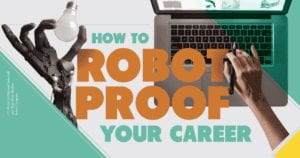How To Robot-Proof Your Career
Almost 20% of what we do at work could become obsolete thanks to automation — how do you stay ahead?
Automating the Workforce
Businesses turn to automation because it increases:
Productivity — Makes business processes 5 to 10X faster
Profit — Could add $15.7 trillion USD to the global economy by 2030
The more routine and predictable a job is, the more likely it is that it will be replaced by robots
What Can Be Automated?
Commonplace tasks in U.S. jobs:
- 18%: Predictable physical activity
- 17%: Data collecting
- 16%: Data processing
Is Your Job Safe?
Nearly 50% of employers say that automation could lead to a reduction in their workforce by 2022
Workers whose jobs could be replaced entirely within a decade or two:
- 4.6M Retail salespeople
- 4.3M Cooks and servers
- 3.8M Janitors and housekeepers
- 2.4M Movers and warehouse workers
In January 2018, Amazon, which has over 500,000 employees, opened a cashier-less grocery store, Amazon Go
But not all experts agree on automation’s impact
According to one study, less than 5% of occupations can be fully automated
Instead, restructuring of jobs ‒ not replacement ‒ is the most likely outcome of automation
What CAN’T Robots Do?
Soft skills ‒ also called “human skills” ‒ are abilities that artificial intelligence cannot reproduce
These skills will only become more valuable as artificial intelligence and technology become more common:
Emotional intelligence: Empathy, curiosity, and nurturing
Creativity: Unique solutions to problems, as well as fine arts
Leadership: Understanding, motivating, and guiding others
Tasks with the lowest automation potential
Based on the amount of soft skills utilized:
- 20% customer service
- 18% planning or creative work
- 9% managing and developing people
Best Outlook Going Forward
Thanks to the use of these tasks, there are industries whose prospects for automation remains low:
- Medical
- Physicians and surgeons .4%
- Dentists .3%
- Occupational therapists .3%
The World Health Organization estimates that 40 million new healthcare workers will be needed by 2030
Education
- Special education teachers, middle school: 1.6%
- Preschool teachers .7%
- Elementary school teachers .4%
Technology
- Software developers for apps 4.2%
- Computer systems analyst .6%
- Mechanical engineers 1.1%
“For those looking to future proof their careers, building competencies in areas that machines will be unlikely to tackle effectively is likely the best recipe for success” – Jeff Desjardins, founder and editor of Visual Capitalist
Keep Your Resume Robot-Proof
Train Yourself
Don’t be afraid of starting over ‒ 35% of Americans have changed jobs in the past 3 years
- 14% of all workers worldwide need to be re-trained
- Take advantage of employer’s professional development tools
- Many companies have free courses available for employee use
- Topics can range from Microsoft Word to blockchain and everything in between
- Seek out further education in your field of interest
- Universities often offer online or graduate certificate programs
- 2012-2016: Enrollment in online graduate and undergraduate courses grew by 17.2%
Move On Up
- Become a manager at your place of employment
- Utilize highly valuable soft skills in leadership positions
- Job shadow a current manager if no positions available
- Start your own business
- Learn flexibility, leadership, and creativity through entrepreneurship
- Dog walking and event planning are among the easiest low-cost businesses to start
- Diversify
- Find a volunteer opportunity in your community
- A way to network as well as learn new skills ‒ while helping a good cause
- 82% of employers would be more likely to choose a candidate with volunteer experience on their resumé
- Get a part-time gig
- Service-oriented, on-demand jobs like TaskRabbit and AirBnB ‒ coordinated entirely online
- A flexible schedule means working when and where you can
Although the automation revolution may be on its way, it is possible to get ahead of the game and keep your skills relevant. What will you do to keep your resume robot-proof?
Sources:
http://info.isg-one.com/rs/257-STB-379/images/2118-ISG%20Automation%20Index%20Report-26April2017.pdf
https://careers.workopolis.com/advice/10-high-paying-jobs-will-survive-robot-invasion/
http://www3.weforum.org/docs/WEF_Future_of_Jobs_2018.pdf
https://www.cbinsights.com/research/jobs-automation-artificial-intelligence-risk/#high_risk
https://money.cnn.com/2017/10/26/technology/business/amazon-earnings/index.html
https://www.seattletimes.com/business/amazon/amazon-go-cashierless-convenience-store-opening-to-the-public/
http://www.visualcapitalist.com/emotional-intelligence/
http://fortune.com/2016/07/11/skills-gap-automation/
https://www.npr.org/sections/money/2015/05/21/408234543/will-your-job-be-done-by-a-machine
http://www.who.int/en/news-room/detail/20-09-2016-un-commission-new-investments-in-global-health-workforce-will-create-jobs-and-drive-economic-growth
https://www.weforum.org/agenda/2018/07/the-skills-needed-to-survive-the-robot-invasion-of-the-workplace
https://www.business.com/articles/offer-professional-development-to-employees/
https://www.entrepreneur.com/article/201588
http://onlinelearningsurvey.com/reports/gradeincrease.pdf
https://www2.deloitte.com/content/dam/Deloitte/us/Documents/us-deloitte-impact-survey.pdf
https://www.lifewire.com/how-does-uber-work-3862752


